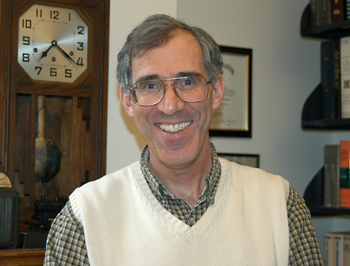Whitworth University establishes master's degree in theology
Whitworth University has embarked on a master’s degree in theology as one way to address the biblical and theological illiteracy its faculty perceives in the society and church. The master’s degree in theology is a program it has long wanted to develop.
“The program is more than opening heads and pouring in content,” he said. “We plan to develop the heart as well.”
The university already has faculty in place to teach the program. They have been involved in teaching the required and elective religion courses Whitworth offers its undergraduates.
 |
| Tom Dolan |
“Many lay people lack grounding in biblical, theological and church history studies. Many don’t know what happened over the 2,000 years of the church that connects to more than their own denominational experience of faith,” said Tim Dolan, who is the director of the master’s program.
He has been at Whitworth for 10 years—since fall of 1998—as director of the Institute for Clergy and Lay Leadership Development with the Weyerhaeuser Center for Faith and Learning. He will continue in that role along with the master’s program.
“We have talked about having a graduate program ever since I started here,” he said. “The center has brought people to campus to sample our faculty for non-degree programs—for certificates or diplomas.”
The other main theological education resources in the Inland Northwest are Gonzaga University’s Religious Studies Department and Moody Bible Institute Northwest Center for External Studies, he said.
The program will operate on a cohort model, in which participants take the same courses together as a group.
The program has more than 20 students signed up to form the first cohort learning community, which will take courses for 27 months, from May 2008 to August 2010. Students can also do the degree at their own pace. Next summer there are plans to offer an option to complete the program full-time in 16 months.
The 37-credit program includes 10 core courses and two electives. It is designed for working adults with evening, weekend and week-long classes, so that people out of the area can come.
There will be elective courses in such areas as congregational renewal, organizational leadership, youth and family ministry, the global Christian movement, church planting and leadership, and theology and the practice of worship.
Tim said the program is for youth ministers, Christian education directors, volunteer coordinators, pastors, nonprofit staff, lay ministers and “anyone looking to commit to a journey of personal spiritual enrichment.”
It begins with an introductory weekend retreat, May 30 and 31, when Whitworth president Bill Robinson will give a presentation on Christian Leadership.
Upcoming sessions include a week-long course on Church History I: The Great Tradition, taught by Jerry Sittser in June; a week-long course on Church History II: Reformation and Renewal, by Keith Beebe in July; a fall weekend course on Christian Spirituality taught by Karin Heller; a week-long course on Christianity and Culture taught by Todd Cioffi in January 2009; a week-long course on Pastoral Ministry taught by Tim in May 2009, and a weekend session led by Bill in May.
Other courses will be on Old Testament Theology by Scott Starbuck; The Life of Jesus and the Early Church by Jim Edwards; Letters of the New Testament by Roger Mohrlang; Christian Theology by Adam Neder, and Teaching and Preaching the Scriptures. Faculty for the last class is to be announced.
The faculty, which includes current Whitworth faculty, represent different church backgrounds, most coming from the Reformed tradition.
“In this ecumenical program students will gain from the faculty’s and other students’ church traditions and theological perspectives, along with exploring their own traditions,” he said.
“They will be able to explore where they come from and how similar and different they are from each other,” he added.
Tim, who attends Colbert Presbyterian Church, said the program will appeal to people serving as pastors but have no theological degree, and to certified lay pastors, lay people serving formally and informally, and anyone seeking more grounding, nurture and enrichment in their faith.
Some graduates may go on for other studies and some may want to transfer credits to a seminary for a master of divinity degree. Whitworth, which has 2,600 students in more than 50 undergraduate and graduate programs, is preparing agreements with seminaries so that will be possible.
“We live in a credentialed culture,” said Tim, who teaches New Testament and the Life and Teachings of Jesus for the Whitworth’s continuing studies program and the theology department.
“This is one means locally to equip people for ministry, wherever they serve and work,” he said.
The students in the first group come primarily from Washington. Many have participated in Weyerhaeuser Center for Faith and Learning courses and have asked for such a program.
The goal is to start a new cohort every May.
Beyond academic content, the program includes community building and spiritual formation. The students will gather for Matins, evening worship and shared meals, as well as participating in classes.
For information, call 777-3222 or email theologyma@whitworth.edu.
Copyright © May 2008 - The Fig Tree




